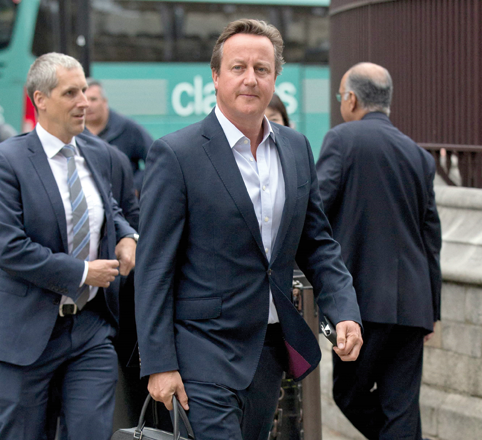You are here
UK’s Cameron vows return to ‘good life’
By AFP - Apr 14,2015 - Last updated at Apr 14,2015

LONDON — British Conservative Prime Minister David Cameron launched his party’s manifesto on Tuesday, promising a return to the “good life” and the revival of a housing policy associated with Margaret Thatcher if he wins May’s election.
Cameron announced an extension of the 1980s “right-to-buy” housing policy of Conservative “Iron Lady” Thatcher, revealed plans for free childcare and pledged that minimum-wage workers will pay no income tax.
With opinion polls putting the centre-right Tories neck-and-neck with the opposition Labour Party, he tried to play on Labour’s weak reputation on the economy in a bid to put his side ahead in the last few weeks of campaigning.
“We’re on the brink of something special,” he told activists at a school in Swindon, southwest England. “Let’s not let Labour drag us back to square one.”
“We can turn the good news in the economy into a good life for you and your family. Britain can be this buccaneering, world-beating, can-do country again,” the prime minister said.
The Conservatives blame Labour for running up a budget deficit of some £90 billion (124 billion euros, $130 billion) during 13 years in government before they were voted out in 2010 and replaced by a Tory-Liberal Democrat coalition.
Neither main party looks set to win an outright parliamentary majority on May 7, raising the prospect of another coalition or a minority government.
Iconic Thatcherite policy
The “right-to-buy” scheme will extend home purchase discounts already enjoyed by some tenants to 1.3 million more tenants of housing associations, private non-profits that provide low-rent accommodation that often receive public subsidy.
“Conservatives have dreamed of building a property-owning democracy for generations, and today I can tell you what this generation of Conservatives is going to do,” Cameron said.
Aimed at tackling Britain’s housing crisis, a hot political issue as house prices and rents soar, the pledge will extend an iconic policy first introduced by then prime minister Thatcher in 1980 and popular with aspirational lower income voters.
Critics claim the original “right-to-buy” policy fuelled Britain’s housing crisis by reducing the amount of affordable housing available.
But Cameron insisted this would not be the case this time as his plan would require each property sold to be replaced on a one-for-one basis.
Liberal Democrat leader and Deputy Prime Minister Nick Clegg said the policy was a “measure of how the Conservatives have run out of ideas”.
“It is not affordable and the figures do not add up,” he added.
‘Unfunded promises’?
At the manifesto launch, the prime minister also announced two other key policies.
Facing accusations that his party serves only the rich, Cameron unveiled plans which would mean no one working 30 hours a week or less on the minimum wage, currently £6.50 an hour, would pay tax.
His announcement came the day after centre-left Labour’s leader Ed Miliband promised to increase the minimum wage and again promised to end “zero-hours contracts”, which guarantee no minimum number of work hours.
Miliband dismissed Cameron’s claims that the Tories were the “party of working people”, saying they only looked after “the richest and most powerful in our society”.
Cameron also announced plans to provide 30 hours of free childcare a week, which he claimed would save families £5,000 a year.
But the Conservatives faced criticism that they had not revealed how they would fund their promises.
Paul Johnson, director of respected think tank Institute for Fiscal Studies (IFS), told the BBC: “We got a very clear sense that the Conservatives are going to have to do an enormous amount over the next three or four years, but almost no sense at all about actually how they are going to do it.”
Separately, a survey published by accountancy firm Deloitte on Tuesday showed that British companies are chiefly concerned about uncertainties over next month’s general election leading to caution over investment.
Deloitte released its findings from a quarterly survey of 108 chief financial officers (CFOs), including those at 21 companies listed on the FTSE 100, who listed their top risks to the outlook.
“Uncertainty over post-election policy change represents the greatest threat to UK business according to the chief financial officers of the UK’s largest companies,” Deloitte said in a report.
The group added that a net 53 per cent of executives are expected to increase capital expenditure over the next 12 months.
That contrasted with a peak of 80 per cent at the same stage one year ago.
“CFOs think the general election poses risks to what is seen as a benign policy environment,” Deloitte indicated. “A clear majority of CFOs see the potential for adverse changes on regulation and taxation. And, on balance, the expectation is that post-election changes will be negative for fiscal, monetary and labour market policies.”
The second biggest risk, according to the survey, was uncertainty surrounding a future referendum on Britain’s membership of the European Union.
Deloitte added that the third biggest risk was given as deflation and economic weakness in the eurozone — and the possibility of a renewed eurozone crisis.
Related Articles
LONDON — Former UK leader David Cameron sensationally returned to the British government as foreign secretary on Monday, as Prime Minister R
His Majesty King Abdullah on Wednesday congratulated Britain’s Prime Minister David Cameron on his party’s win in last week’s general election.
Britain's political leaders on Tuesday began a final push for votes ahead of this week's knife-edge election, even as they prepared for the likelihood of protracted coalition talks once polls close.
















